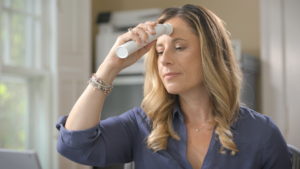Exergen Temporal Thermometer: Your Flu Season Essential
 During severe flu seasons, nearly 50,000 Americans die from the disease, according to the American Lung Association. While medical experts can’t predict the severity and length of this year’s flu season, they do expect the H1N1 strain to be present again and to spread across the nation.
During severe flu seasons, nearly 50,000 Americans die from the disease, according to the American Lung Association. While medical experts can’t predict the severity and length of this year’s flu season, they do expect the H1N1 strain to be present again and to spread across the nation.
Flu season in the United States typically ranges from November through March and sometimes lasts into early spring. Now is the time to start protecting yourself and your family.
The most important step is to get vaccinated, says the Centers for Disease Control and Prevention (CDC). Here are some additional ways to prepare for flu season.
Effective Flu Prevention Strategies
- Take precautions. While the CDC recommends everyone six months and older get vaccinated, it is especially important for children, pregnant women, the elderly and those with chronic health conditions. The H1N1 strain of the virus will automatically be included in this season’s flu vaccine. Call your doctor if you have questions and contact your town hall or local pharmacy to see if they have a public clinic.
- Practice proper hand hygiene. Wash hands with soap and water for at least 20 seconds. If you’re on-the-go, keep a hand wipe or sanitizer product with you. Also, teach children to cover their nose and mouth with either a tissue or elbow – but not their hands.
Identifying Flu Symptoms Accurately
Tell the difference. The flu and the common cold share many of the same symptoms and it can sometimes be difficult to tell them apart. A key way to identify the flu is the sudden onset of a high fever. A fever is your body’s natural response to an infection. However, it’s important to know that not everyone with the flu will have a fever.
For a more detailed comparison of cold and flu symptoms, read our comprehensive guide on Is it a Cold or the Flu?
Other flu symptoms can include a headache, general aches and pains, fatigue, exhaustion, stuffy nose and cough. The right diagnosis can make the difference in treatment and give you faster relief, so getting a quick and accurate temperature is essential.
The Science Behind Exergen Temporal Scanner
The Exergen Temporal Scanner gently and accurately measures body temperature in just two seconds by capturing the naturally emitted heat from skin with a scan over the temporal artery, located on the forehead just below the skin. This artery is connected to the heart via the carotid artery.
More than two dozen independent medical studies attest to its accuracy for people of all ages and you can the thermometer it at local retailers or by visiting //www.exergen.com/coldfluseason.
Why Choose Exergen for Your Family
“Whether it’s my own child or a patient in the hospital, I know that taking a child’s temperature can sometimes be a challenge, particularly if the child is uncomfortable and fussy,” says Linda Ciampa, a registered nurse and a former health correspondent for CNN. “What I love about the Exergen TemporalScanner is that it’s less invasive than a tympanic (ear), rectal or oral thermometer, and so easy to use that you can take someone’s temperature even when they are asleep.”
Home Remedies for Flu Symptoms
Treat your symptoms. The flu is a virus and cannot be treated with antibiotics. While antivirals can cut the duration of the flu by a day or so, you can use some home remedies to treat flu symptoms. Check with your physician for more details.
- Take a fever reducer and anti-inflammatory like ibuprofen (unless you have stomach conditions).
- Rest, and rest some more.
- Drink more fluids than normal to avoid dehydration.
- Use a sinus rinse if you have congestion.
- Use a humidifier to add moisture to the air and help drain congestion.
- Stay at home to avoid transmitting the virus to other people.
When to Consult Healthcare Professionals
Keep in mind, while a cold is rarely serious – and often more of a nuisance than anything else – the flu can lead to additional complications, particularly in young children and the elderly.
So, if you suspect it’s the flu, call your health care provider.
